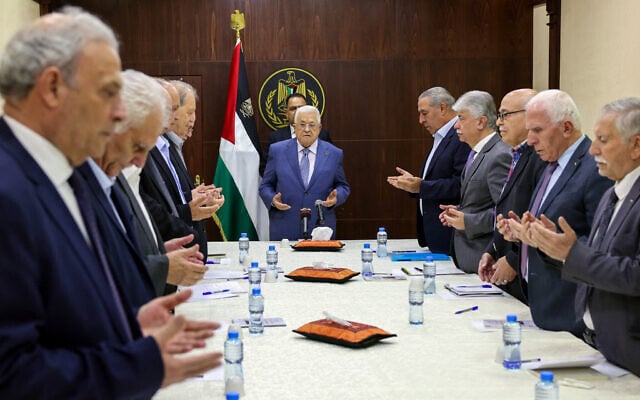IN THE MEDIA
Praise from Hamas co-founder is bad. Palestinian Authority is also a flaw of recognition
August 14, 2025 | Oved Lobel

Australian Financial Review – 14 August 2025
“Our government has made it clear that there can be no role for the terrorists of Hamas in any future Palestinian state,” Prime Minister Anthony Albanese declared on August 11 as he announced that Australia will join several other Western nations recognising the State of Palestine at the 80th session of the United Nations General Assembly in September.
“This is one of the commitments Australia has sought, and received, from President Abbas and the Palestinian Authority.”
In a follow-up TV interview, Albanese said, “Hamas will be totally opposed to this decision.”
The argument didn’t age well. Two days later, a co-founder of Hamas not only welcomed Canberra’s resolution but credited the October 7 atrocities and Hamas’ commitment to violence as the reason for it.
While there are countless reasons to criticise the government’s decision to recognise Palestine, perhaps nothing better encapsulates its seriously flawed and futile approach than saying its position is predicated on PA commitments.
In the first place, even if it genuinely wanted to, and it does not, the PA has no power to guarantee anything.
If the PA had been able to enforce its writ, Hamas would never have taken over Gaza in the first place, when it easily trounced the entire PA security apparatus virtually overnight in 2007 in a small-scale civil war. This would have repeated itself eventually in the West Bank but for Israel’s ongoing security control in much of the territory.
The reason Israel has had to launch large-scale operations in the West Bank over the past two years is that, whatever the PA may ostensibly control on paper, it controls little in practice.
Even when it had genuine power, the PA under Yasser Arafat was either unable or unwilling to crack down on or even marginalise Hamas to any serious extent. Now the PA is nothing but a sclerotic shadow of its former self, totally dependent on Israel for its survival and burdened with a backlog of unfulfilled pledges to reform, crack down on terrorism, end incitement and hold new elections stretching back decades.
Nor does the PA have legitimacy among Palestinians, most of whom despise it and its president, Mahmoud Abbas, whom approximately 80 per cent want to step down.
Hamas need not launch another violent coup to take control of a theoretical future state under PA control – it could win such control at the ballot box, as it has before. This is why Abbas has not allowed elections since 2006.
In a May 2025 poll by the Palestinian Centre for Policy and Survey Research, 43 per cent of respondents said they’d vote for Hamas in new legislative elections as opposed to 28 per cent for Abbas’ Fatah. In a two-way presidential election between Abbas and a Hamas leader, the latter would win in a landslide.
This problem will now be exacerbated because Palestinians will associate October 7 and Hamas with recognition of a Palestinian state.
Further, from Abbas on down, the PA is behind much of the anti-Israel incitement and indoctrination of Palestinian society, not only via official speeches and media organs, but through the school textbooks it produces, which are used in both its own and in UNRWA classrooms.
Even if the PA wanted to do so, and it does not, an about-face against anti-Israel incitement would only further delegitimise it in Palestinian eyes.
It’s also unclear whether the PA’s so-called “pay-for-slay” program – which incentivises terrorism against Israelis by paying the families of wounded, killed or imprisoned attackers based on the outcomes of the attacks – has been genuinely reformed to be purely needs-based.
The Biden administration was reportedly close to forcing the PA to enact those reforms in March 2024, and Abbas officially decreed the end of the program in February 2025. There is evidence as of May that at least some payments had become needs-based.
What Israel can’t seem to accomplish with intense military pressure, the PA certainly can’t accomplish without. If the IDF itself has not yet managed to destroy Hamas’ governance or military control of Gaza after nearly two years of brutal war, the PA couldn’t possibly guarantee the organisation’s disarmament and disengagement from Palestinian politics.
It should be noted that nearly 80 per cent of Palestinian respondents oppose the disarmament of Hamas, according to the May 2025 poll.
The Palestinian Authority has long been a non-entity in Gaza. It is only relevant in the West Bank because of Israeli protection, and it’s unlikely it will survive the death of its dictatorial leader. Rather, it is more likely to implode and at least temporarily dissolve into warring factions and gangs.
To predicate recognition on impossible commitments made by this corrupt, oppressive, hated, marginal and moribund entity would discredit Australia’s position even if it were otherwise a productive contribution to peace, which it is not.
That the prime minister justified his policy change based on such commitments reflects, at best, a deep misunderstanding of the situation.





